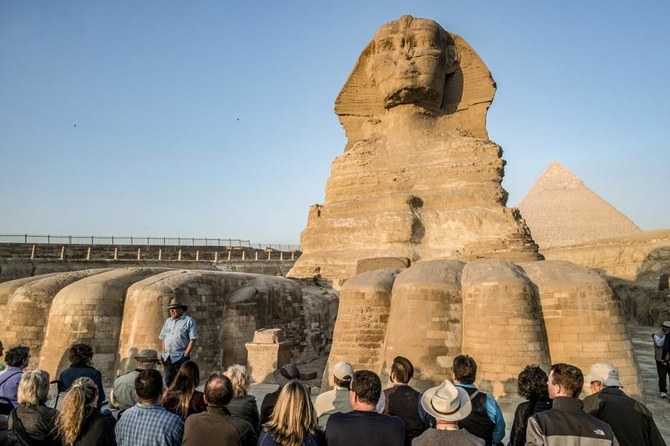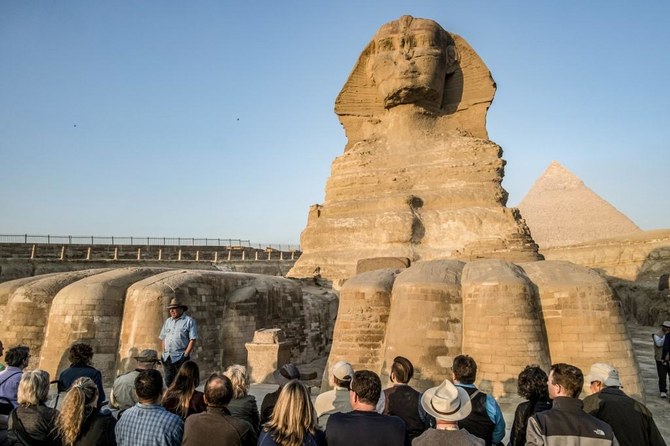LUXOR, Egypt: It’s a steamy November day in the southern Egyptian city of Luxor, and the tourists tramping through the ancient temples of Luxor and Karnak are sweating. But the city’s famed 7,000-year-old antiquities are feeling the heat too.
Increasingly high temperatures linked to climate change, as well as wilder weather, particularly heavy rains and flooding, are taking a growing toll on the ancient stonework, said Abdelhakim Elbadry, a restoration expert who works at Karnak temple.
“The changes appear noticeably, in the damage and cracks of the facades of many graves as well as the change of the color of the archaeological stones, as a result of high temperature and humidity,” Elbadry told Thomson Reuters Foundation.
Granite that was once rose-coloured has faded to a pale pink or even light grey over the last 15 years, he said.
“In every archeological site here in Luxor, you can witness the changes,” he said.
Climate change is making efforts to protect Egypt's famed but fragile archaeological sites even harder, preservation experts say.
From the pyramids and Sphinx to the Citadel of Qaitbay and an ancient Roman amphitheatre near the Mediterranean Sea, the country's historic sites face growing threats from harsher weather and rising seas.
Egyptologist Zahi Hawass - the country's former Minister of State for Antiquities Affairs - said virtually all open-air archeological sites in Egypt are in danger from stronger winds and humidity, higher temperatures and bigger floods.
“I believe that in 100 years all these antiquities will be gone because of climate change,” Hawass said, referring to expected serious deterioration of the monuments.
He said offices staffed by specialists should be set up near each of the country's archeological sites to record the changes taking place, try to find immediate solutions and to coordinate restoration of damage.
He has called for a joint effort by Egypt and the European Union to try to mitigate the effects of climate change on Egyptian antiquities.
Monica Hanna, an archaeologist with the Arab Academy for Science, Technology and Maritime Transport, said she believes many Egyptian historic sites near the Mediterranean Sea could see significant damage from rising sea levels linked to climate change within about 30 years.
Alexandria, Egypt's second-largest city, faces some of the biggest risks.
In remarks in Germany last year, Patricia Espinosa, head of the U.N. climate change secretariat, warned that climate change posed particularly severe threats to low-lying coastal cities such as Alexandria and Osaka in Japan.
Climate impacts "are not going to get better, they are going to get worse," she warned.
But a shifting climate also is just one of the threats to Egypt's antiquities, which also face pressure from everything from worsening air pollution to expanding settlements as the country's population grows, Hanna said.
Air pollution can erode the limestone and sandstone blocks that make up many ancient structures, she said, and the construction of housing areas without proper sewage systems, in areas near historic sites, can cause "tremendous" damage.
Egyptologist Hawas said visiting tourists also remain a threat to the structures they flock to admire.
"The flashes of mobile phones, the breathing and touching the antiquities — all these have really harmful effects," he said.
Government action
Hussein Abdel Basir, director of the Antiquities Museum at the Bibliotheca Alexandrina, said the government is taking some action to better protect its archaeological sites from climate threats.
In Alexandria, the national government has earmarked $14 million to protect the Citadel of Qaitbay from coastal erosion.
"A total of 4,700 concrete blocks have been dropped in the water around the citadel in order to protect it from rising water," Abdel Basir said.
In addition to that effort, which started in late 2018, the government is putting in place projects to protect beaches from higher waves and stop coastal erosion.
Abdel Basir said about 230 foreign-led archeological missions operate in Egypt, and about 10% of those are carrying out work to reverse degradation seen in the country's famed antiquities.
But that is still far too little to adequately deal with the growing climate change threats, he said.
The endangered monuments are "the heritage of the world. It is not only Egypt’s civilisation that is being threatened, it is the history of humanity," he said.






















